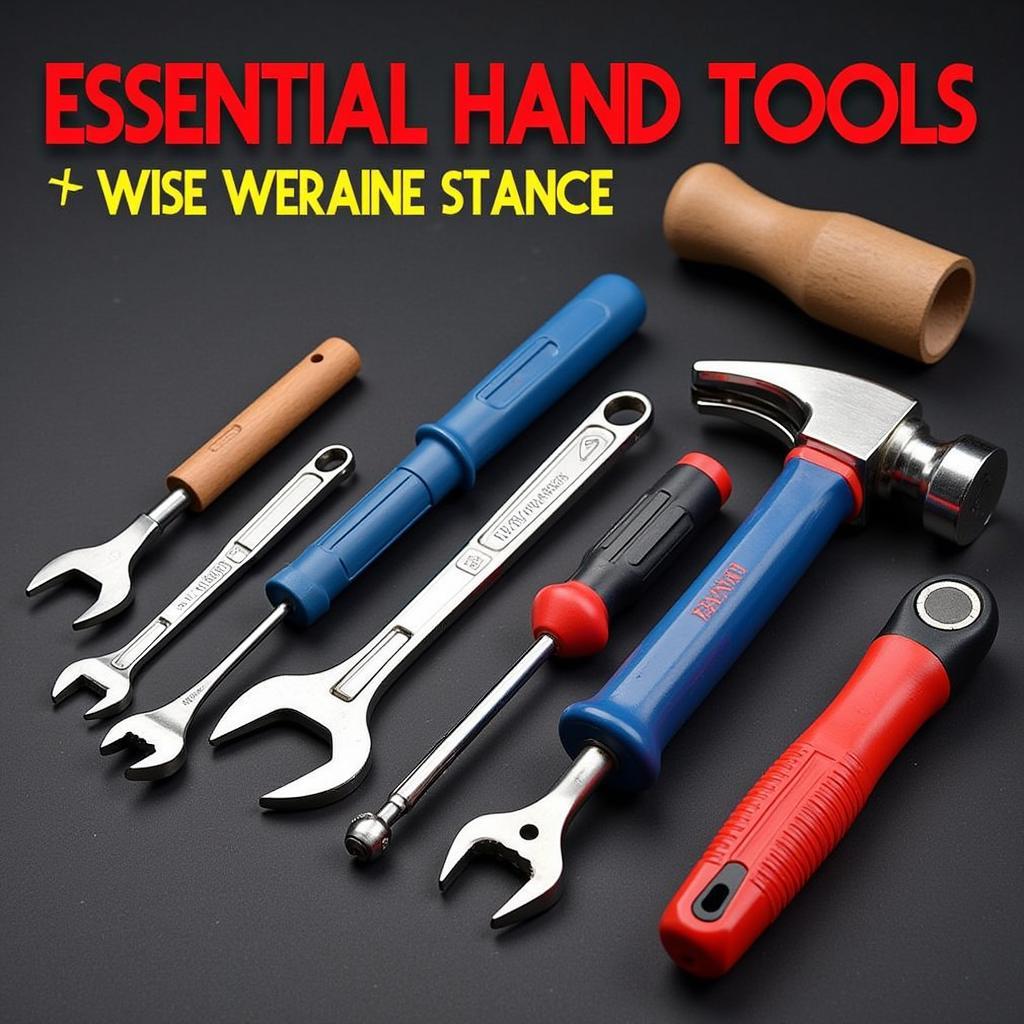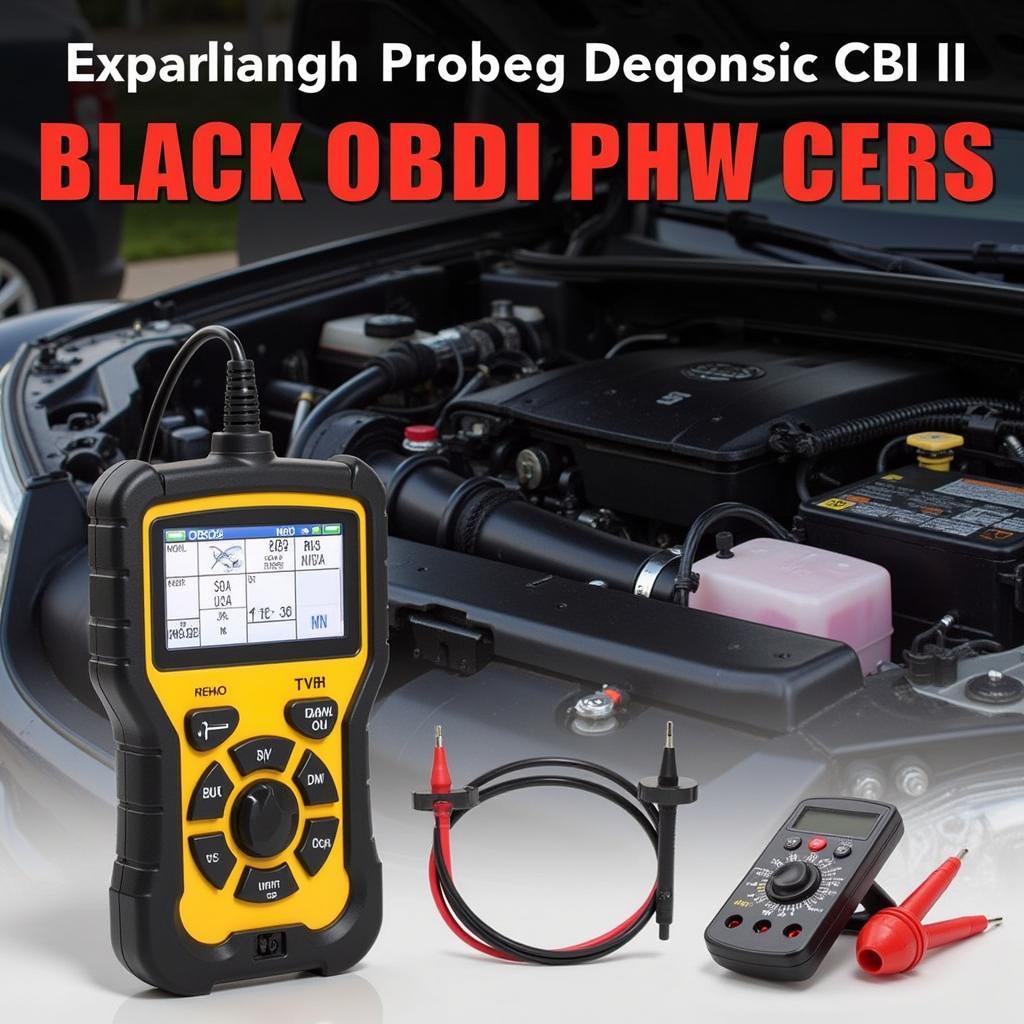Working on your car can be intimidating if you’re not familiar with the necessary tools. Having the right equipment can make a difference between a successful DIY project and a frustrating experience. This guide will cover the most useful tools for working on cars, from basic maintenance to more advanced repairs. Let’s dive in and explore the essential tools that every car owner or enthusiast should have. For those looking to expand their collection of car tools, a comprehensive tool kit for cars can be a great investment.
Essential Hand Tools
Every car owner should have a basic set of hand tools for simple tasks like changing a tire or replacing a battery. These include:
- Screwdrivers: A set of Phillips and flathead screwdrivers in various sizes is essential for removing screws and fasteners.
- Wrenches: Combination wrenches (with both open and closed ends) in both metric and standard sizes are crucial for tightening and loosening bolts.
- Pliers: Needle-nose pliers are great for reaching tight spaces, while slip-joint pliers are useful for gripping and turning larger objects.
- Socket Set: A socket set with a ratchet handle allows for easier and faster removal of nuts and bolts, especially in confined areas.
- Hammer: A small ball-peen hammer is useful for tapping and persuading stubborn parts.
These basic hand tools will cover many common car maintenance tasks and are a great starting point for any budding mechanic.
 Essential Hand Tools for Car Maintenance
Essential Hand Tools for Car Maintenance
Diagnostic Tools for Troubleshooting
Identifying car problems often requires more than just hand tools. Diagnostic tools are essential for troubleshooting and understanding what’s going on under the hood. Some of the most useful diagnostic tools include:
- OBD-II Scanner: This tool plugs into your car’s diagnostic port and reads error codes, providing valuable insights into the source of problems.
- Multimeter: A multimeter measures voltage, current, and resistance, helping you diagnose electrical issues.
- Test Light: A simple test light can quickly check for power or ground connections.
- Vacuum Gauge: This tool measures engine vacuum, which can help diagnose issues with the intake manifold, carburetor, or other engine components.
These diagnostic tools empower you to understand your car’s health and identify problems before they become major headaches. If you’re locked out of your vehicle and require specialized tools, consider exploring options for locksmith tools car lock out.
 Essential Diagnostic Tools for Car Repair
Essential Diagnostic Tools for Car Repair
Power Tools for Efficiency
While hand tools are essential, power tools can significantly speed up certain tasks and make more complex repairs possible. Some useful power tools include:
- Impact Wrench: An impact wrench removes lug nuts and other tightly fastened bolts with ease, saving you time and effort.
- Drill: A cordless drill is versatile for various tasks, including drilling holes and driving screws.
- Angle Grinder: An angle grinder is useful for cutting and grinding metal, such as removing rusted bolts or shaping metal parts.
- Sander: An orbital sander is helpful for smoothing surfaces and preparing them for painting.
What are the best tools to change a tire?
A jack, lug wrench, and spare tire are the essential tools for changing a tire. You may also need wheel chocks.
What tools do I need for basic car maintenance?
For basic car maintenance, you’ll need screwdrivers, wrenches, pliers, a socket set, a hammer, and possibly some specialized tools like a car radio unlock tool. Knowing where to find the cheapest retail store to buy roadside tools for cars can be beneficial as well. Don’t forget about and amanda some safety tools for your cars.
Conclusion
Having the Most Useful Tools To Work On Cars empowers you to perform basic maintenance, diagnose problems, and tackle more complex repairs. From simple hand tools to advanced diagnostic equipment and powerful power tools, the right tools can transform your car maintenance experience. Investing in quality tools and learning how to use them properly is essential for any car owner or enthusiast. With the right tools in hand, you can confidently keep your car running smoothly for years to come.
FAQ
- What is the most important tool for a beginner mechanic? A good set of screwdrivers and wrenches is a great starting point.
- Do I need a diagnostic tool if my car is new? While not strictly necessary, an OBD-II scanner can be helpful for understanding your car’s systems and catching potential problems early.
- What type of socket set should I buy? A combination set with both metric and standard sockets is recommended.
- Are power tools essential for car maintenance? While not essential for all tasks, power tools can save time and effort for more demanding jobs.
- Where can I find quality car tools? Reputable automotive stores and online retailers offer a wide selection of car tools.
- How do I know which tools are right for me? Consider the types of repairs and maintenance you plan to perform and choose tools accordingly.
- Is it worth investing in professional-grade tools? If you plan to do a lot of car work, investing in high-quality tools can be a worthwhile investment in the long run.
Common Car Repair Scenarios:
- Flat Tire: This requires a jack, lug wrench, and a spare tire.
- Dead Battery: Jumper cables or a battery charger are necessary.
- Overheating Engine: Basic hand tools can help diagnose leaks or other issues, but a diagnostic tool can provide more specific information.
- Brake Problems: Wrenches, sockets, and specialized brake tools are often required.
Further Reading and Resources:
Check out our other articles on DiagFixPro for more information on specific car repair topics and tool recommendations.
Need help with your car diagnostics? Contact us via WhatsApp: +1(641)206-8880, Email: [email protected] or visit us at 910 Cedar Lane, Chicago, IL 60605, USA. We have a 24/7 customer service team ready to assist you.

Leave a Reply